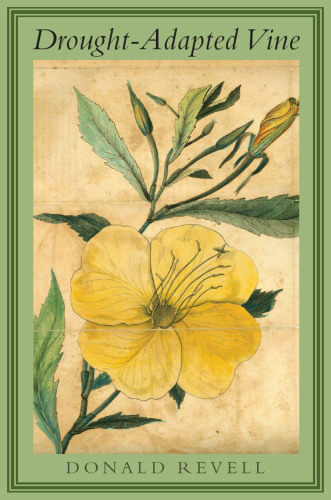
Drought-Adapted Vine
کتاب های مرتبط
- اطلاعات
- نقد و بررسی
- دیدگاه کاربران
نقد و بررسی

Starred review from July 20, 2015
Ecstatic and eminent, reverent and much-revered, Revell (Essay: A Critical Memoir) continues his rapturous and challenging attention to the presence of divinity in nature, and to the reminders of death in daily life. In his visions, he takes opposites—such as grief and worship, or transcendence and emptiness—and turns them into complements: “The day is mountains, too many mountains,” yet “flowers are never out of place,/ Never wrong.” Revell’s unrhymed sonnets, his paradoxical verse prayers, and his central sequence (which has no standard form) also amount to an elegy for his mother, whose funeral recurs among his images of flowering trees, “forsythia/ Starry for hopeful, root and branch.” The poet, editor, and translator now looks hardest and longest at places and things from back East, from his childhood: “Steeple that buried my parents/ Under the hill was a staircase too.” Like one of his conscious influences, Henry David Thoreau, Revell demonstrates his spontaneity and his unmediated, often delighted, relationship to nature even while he teaches us, unshowily, about who and what he has read. Yet the stars in this volume are not the older writers he quotes or references, but the boldly sketched scenes, animals, trees, and buildings; each is a momentary conjunction of faith with language, addressed with a pellucid power that invites even unprepared readers to join in.

September 15, 2015
Like a "drought adapted vine," the narrator in this latest from Pushcart/PEN Award winner Revell (Tantivy) struggles with the world's sad condition, adjusts, and survives--is changed, in other words, though a semblance of his former self remains. In sonnet-like verses that are often rapturous meditations transcending lyric margins, meaning disappears like a "wisp of smoke"--is there, lingering, and then gone. Revell's imagery snaps with color and sings with a revelatory music as he pays homage to artists, musicians, and Shakespeare especially. The verse here is serious--the poet writes of God and faith and questioning--but there's still humor: "I believe in Heaven/ Simply because there must be someone at one/ O'clock in the morning who answers the phone." Quietly prophetic and visionary, if charmingly eccentric, he says, "The future is all fences/ Stray cats, and heroes walking backwards." These are sometimes difficult poems, demanding intersections of word and music, yet they are holy and wholly original. VERDICT An important book from an important poetic voice.--Karla Huston, Appleton, WI
Copyright 2015 Library Journal, LLC Used with permission.

























دیدگاه کاربران